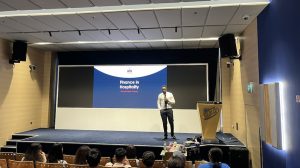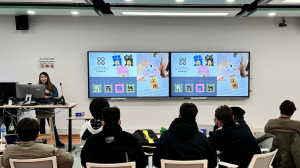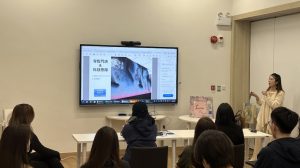The IFTM Student Union’s new leadership was installed at the end of February. Rebecca Leong Cheng Mei, the new President, reveals some of the association’s main initiatives for the next 12 months
The aims of better serving fellow students, enhancing exchange activities, and supporting IFTM’s development are key aspects in the programme of the IFTM Student Union’s new leadership. The recently-elected management team, led by Executive Committee President Rebecca Leong Cheng Mei, a Year 2 student in the Tourism Event Management Bachelor’s Degree Programme, is enthusiastic about achieving those objectives.
Rebecca emphasises that a significant goal for the next 12 months is to ensure the Student Union continues acting as a communication bridge between the Institute and the student body. Additionally, the group aims to remain a provider of support and services for fellow students, contributing to further enhancements in IFTM’s educational environment and to the Institute as a whole.
The Student Union’s fresh leadership was inducted for a one-year term at a ceremony held in the Grand Hall on the Mong-Há Campus on 24 February. During the ceremony, the heads of several sub-organisations under the Student Union also took their oaths.
Notable figures and guests attending the ceremony included IFTM President Dr. Fanny Vong Chuk Kwan, Institute Vice Presidents Dr. Connie Loi Kim Ieng and Ms. Diamantina Coimbra, and the Functional Head of the Department of Students at the Education and Youth Development Bureau, Ms. Hong Wai Man.
The governing bodies of the IFTM Student Union consist of its executive committee, supervisory council, and general assembly.
The new Student Union President reveals that the group is planning to organise more exchange events and to seek partnerships with student associations from other educational institutions for joint hosting of activities.
“Many new Student Union leadership members are either Year 1 or Year 2 students”, and they are “very active in taking up responsibilities,” states Rebecca. She hopes that those joining the Student Union’s management can boost their personal development, learn new things, and eventually aspire to be candidates for a second term.
Rebecca anticipates that her Student Union role will also help her personal development. “Throughout the upcoming year, I hope I can become stronger and more confident in myself,” she says. She already has experience of being a member of a student union at her secondary school.
Typically, elected positions in IFTM’s Student Union are held by students either in Year 1 or Year 2 of bachelor’s degree programmes. The availability of Year 3 and Year 4 students is typically constrained by factors such as either participation in the Institute’s six-month curricular internship or the need to complete their graduation thesis.
”We will continue the work of last year’s leadership,” Rebecca states. One area of expansion involves partnerships with local merchants to provide discounts and special offers to IFTM students. “We are planning to enlarge the scale of the programme and strive for more down-to-earth offers,” she says.
Editor: IFTM Public Relations Team









